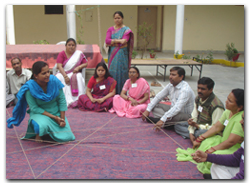

Offer professional and short-term training and capacity-building in EE and sustainable development issues; Pool institutional resources and extend the reach of the programmes through linkeges with various agencies.
Networking is not only a key activity but also an important characteristic of CEE's projects and programmes. It is seen as a way to gain access to a greater range of expertise and other resources, and avoid the duplication of efforts by efficient use of available resources. As an intrinsic feature of most of CEE's educational and training programmes and initiatives, it enables the pooling of institutional resources and extends the reach of projects and programmes.

CEE has developed national and international linkages with numerous agencies, both governmental and non-governmental, working in related fields. These linkages are in the form of collaborative projects, exchange programmes, mail contact, symposia and seminars. It encourages its staff members to further facilitate the cause of EE by participating in workshops and seminars or delivering talks in fields related to EE.
Some Major Programmes
Also visit:
UNDP-GoI Endogenous Eco-tourism Project
In recent years, there has been an increasing recognition of the importance of education for achieving sustainable development. A growing number of educational and action programmes for conservation, environment protection and sustainable development have been initiated in the country, but their successful implementation is constrained by a shortage of trained personnel. Many universities, in recent years, have introduced courses in environmental studies, but little attention has been paid to the development of communication skills that are essential for effective work in the field.
CEE has, since its inception, focused on capacity building professionals for carrying out effective environmental education and sustainable development programmes. The aim is to develop a cadre of professionals in order to improve and strengthen professionalism in the field of ESD. The training programmes are designed to enhance awareness, instil a positive attitude towards the environment and develop the skills needed to tackle and resolve environmental problems as well as communicate effectively about environmental issues. A range of short and long term training programmes are offered.
Regular Programmes:
Also visit:
Distance Learning Programmes (DLP):
Tailor-made Programmes:
CEE also offers tailor-made programmes on request from the Government, NGOs, academic institutions in India and other countries. For example:
Some Other Programmes
Established as a Centre of Excellence of the Ministry of Environment, Forest & Climate Change, Government of India.